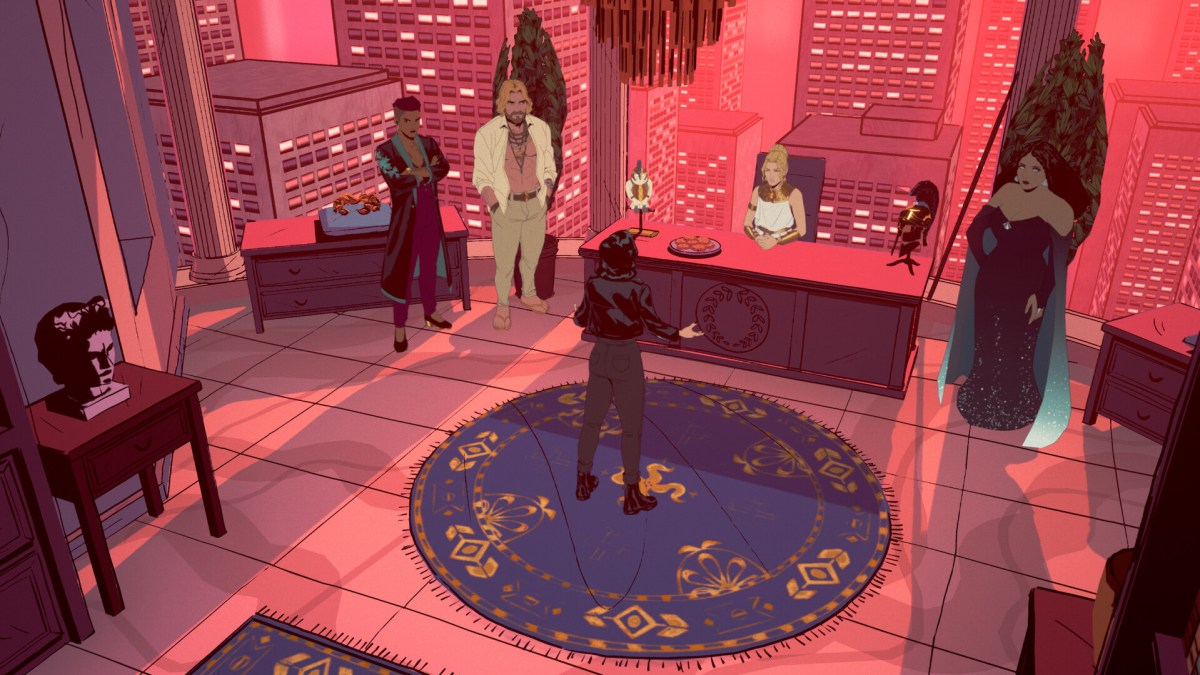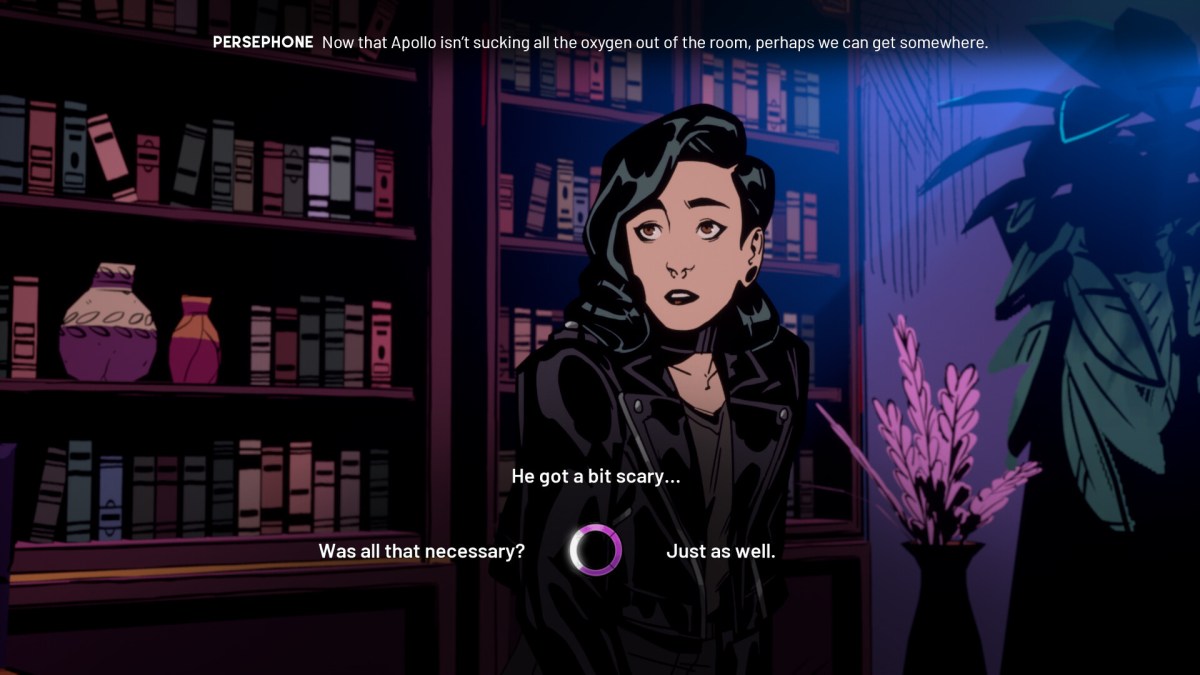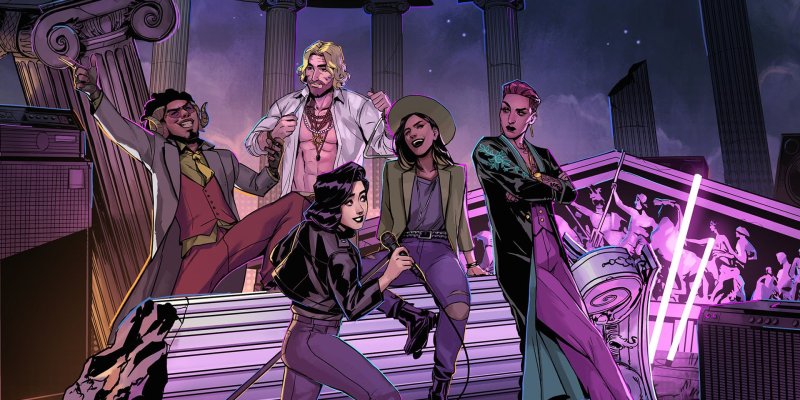Ten minutes, maybe less. That’s how long it took for the Stray Gods demo to blast away any straggling doubts I had about the game. I’ve been following it since it first popped on Fig in October 2019 with its original name, Chorus. The proof-of-concept demo from back then was great, but the new one that the team dropped for this year’s LudoNarraCon is something else entirely. It’s compelling, it’s electrifying, and it makes a case for Stray Gods to be the most engaging narrative-based game I’ve ever come across.
There’s a world-weariness to the opening. A band has gathered for a disastrous audition session. It’s not clear what they’re looking for — it’s hard to know if even they know — but that’s not the important part. What matters is how easily you come to feel for the four of them, especially protagonist Grace and her best friend Freddy. A part of that is the naturalistic delivery. There’s a fast-paced patter to the dialogue that makes the banter shine and the honesty feel extremely vulnerable.
It stands out from among the demos I’ve played from LudoNarraCon because the bandmates seem, above all else, human. Goodbye Volcano High was another one I was extremely excited for, and… okay, that game is about angsty, anthropomorphic dinoteens waiting for an apocalypse, but the characters there are so heightened in comparison. There’s a cartoon energy to it that is interesting but lacks the gripping tension at play in Stray Gods. There’s something similar in the demo for Harmony: The Fall of Reverie, the next game from Life is Strange studio Don’t Nod, where the stakes get too high, too quickly, and the human element of Polly’s missing mother is lost in the noise.

I think a part of it is that Stray Gods gives you almost immediate control over who Grace is. You decide if she’s going to be playful or cagey with her friends, and there’s genuinely no sense of a wrong decision. This motley collective accepts her for whomever you want her to be. But then the night comes to an end. They leave and Grace stays, and she reflects.
If you know anything about Stray Gods, you know what’s coming. If you don’t — it’s a musical, so Grace breaks into song. She’s drifting. Unmoored. Uncertain. The feeling felt by every generation of young people flung from the nest of childhood and forced to navigate the fraught landscape of adulthood. It’s nothing short of enchanting, and it ends with you choosing which of three Traits your Grace will focus on. Will she be charming, clever, or kick-ass? Your decision changes the tenor of the song and, I hope, the tenor of the whole experience. It’s a taste.
And what a delicious taste it is. But it’s just the entree, and the demo follows it up with a mere small forkful of the main course. It’s suddenly later. Grace and Freddy are in an apartment, alongside the god Pan, depicted here as a very slick operator. He’s trying to tempt Grace, and you have to decide how to respond — through a song, of course. It plays out as a duet as you and Pan go back and forth. As you listen to his lines, you have to make quick decisions about what to sing back. Of course, you can just butt through by following whatever Trait you chose earlier, but that robs the scene of its dynamism, of the intangible flow of a discussion or debate.

It reminds me of Life is Strange: Before the Storm in the way it gives dialogue the texture of video game combat. Except it’s deeper here. There’s a sense of the push and pull between singers, the need to understand what your opponent is trying to do and figure out the best way to defend and parry. The fact that it all takes place against the backdrop of swelling music serves as dressing. It gives that struggle a cadence that becomes all-consuming.
And the variance! I played the demo twice, making different choices at every turn. While the story I saw didn’t really change, other than the outcome of the confrontation with Pan, the feeling did. My first Grace was closed off, a little uncertain, but the second was confident. My first wavered between the notes she hit, but the second was punk rock through and through. I don’t know yet what my third will be, but she will exist. And then when the full game hits, I’m sure an entirely new Grace will be waiting, as compelling and powerful as any of these fleeting glimpses at who she might be.
The diversification of narrative games is exciting, no doubt, but I still occasionally long for the straightforwardness of the earliest walking sims. I don’t want every story I play to be blocked by puzzles like in Call of the Sea or buried in layers of opacity like in Scorn or wrapped in dull lore and awkward RPG elements like in Vampire: The Masquerade – Swansong. Stray Gods isn’t quite that, but it’s got something else going for it: an energy entirely unlike anything I’ve seen in any other game.
